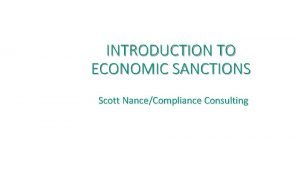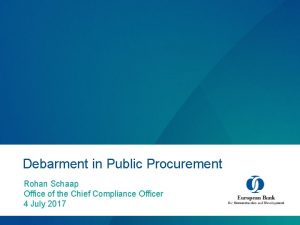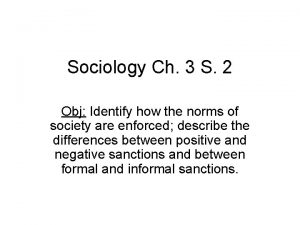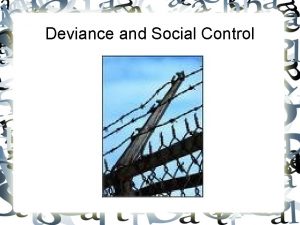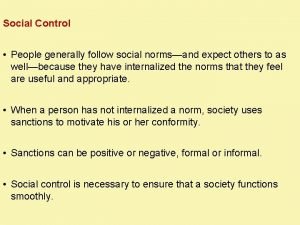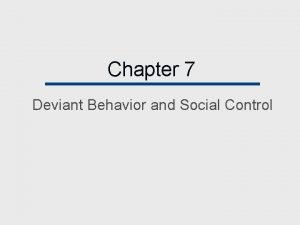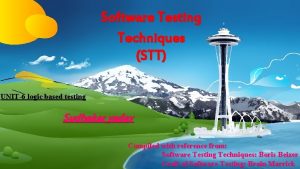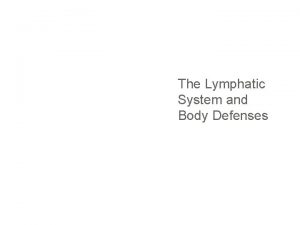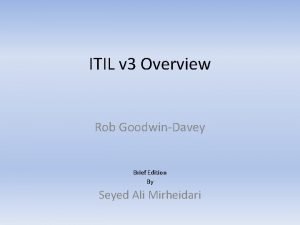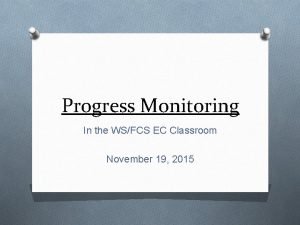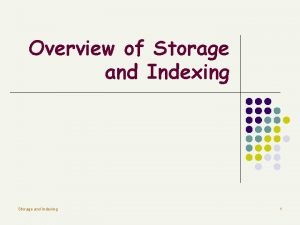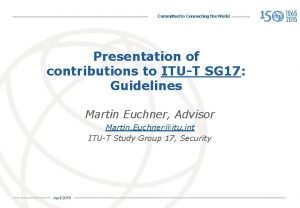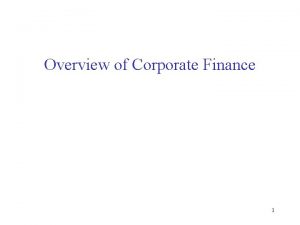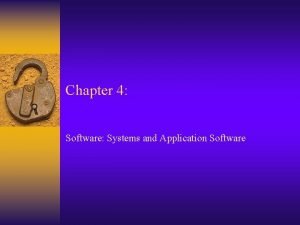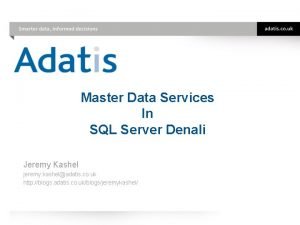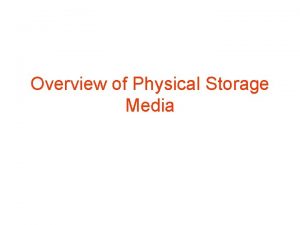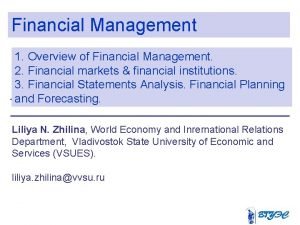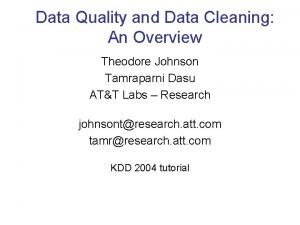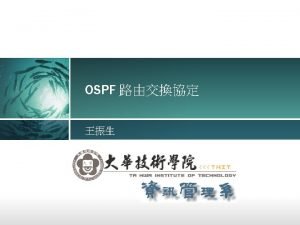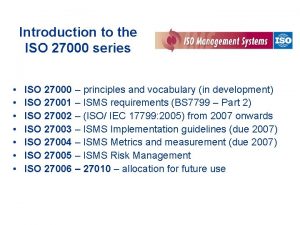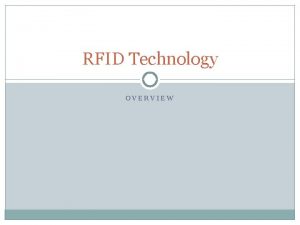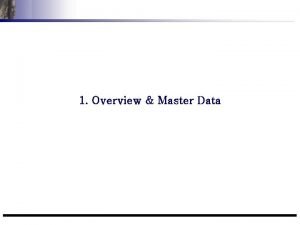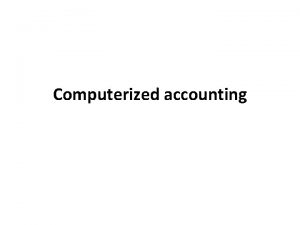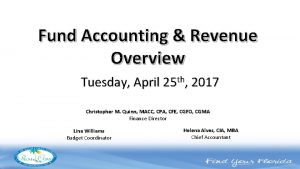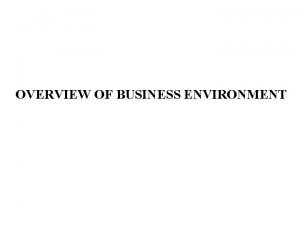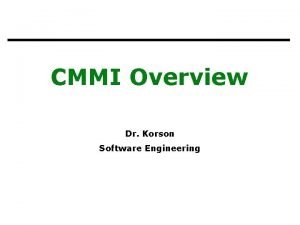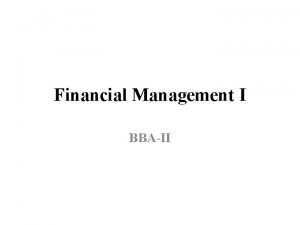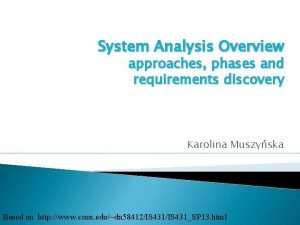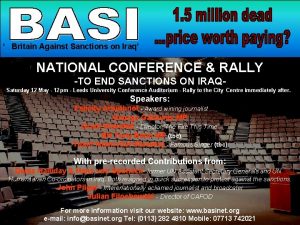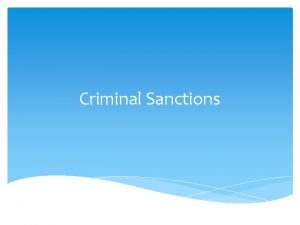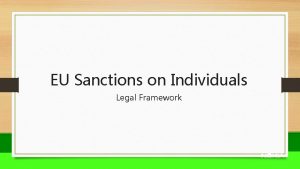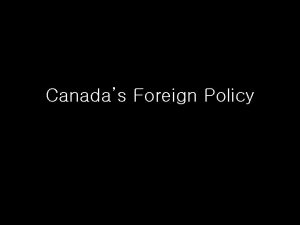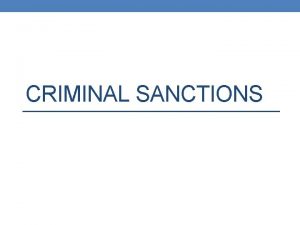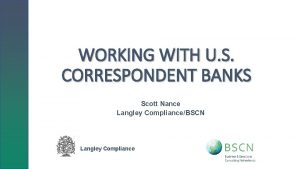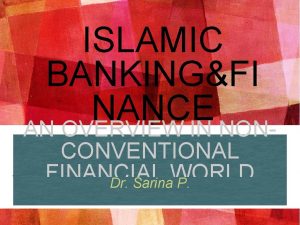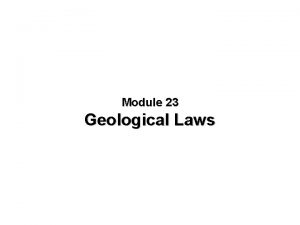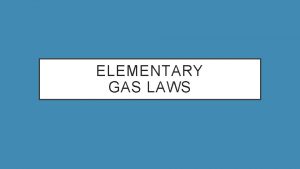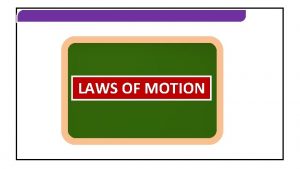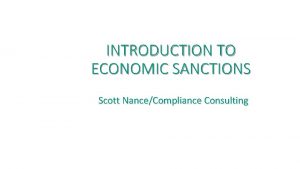Overview of U S Sanctions Laws Scott Nance



















































- Slides: 51

Overview of U. S. Sanctions Laws Scott Nance Compliance Consulting

Overview • • Organization of US sanctions laws Administration of US sanctions Targets and types of US sanctions Categories of sanctions – SDNs – Individual countries – Activities 2

Sources of US Sanctions Laws • Constitution • Statutes (laws passed by Congress) • Executive Orders (orders by the President, authorized by statute) • Regulations (rules issued by an administrative agency under either a statute or an EO) • Licenses (general and specific) (permission to perform an action) • Guidance (no legal standing) • Past decisions (no legal standing) 3

The Constitution • The US Constitution is the supreme law of the United States • The Constitution assigns to Congress the power to “regulate commerce with foreign nations” (Art. 1, Sec. 8) • The Constitution also sets due process requirements for legal liability and crimes 4

Sanctions Statutes • Statutes are laws passed by Congress and signed by the President • The two main statutes concerning sanctions are – Trading with the Enemy Act (Cuba) (50 USC Appendix) – International Emergency Economic Powers Act (all others) (50 USC 1701) • These statutes give the President broad powers, including the power to – Prohibit transactions – Order the freezing of assets held by individuals and entities • There also a number of statutes imposing sanctions against specific countries, including Iran and Sudan 5

IEEPA and TWEA • The International Economic Emergency Powers Act (IEEPA) and the Trading with the Enemy Act provide the authority for the President to act on sanctions – IEEPA is the underlying source of authority for all sanctions programs except Cuba – Cuba sanctions are based on TWEA • To invoke IEEPA, the President must declare an emergency – The emergency must originate from events outside the United States • Under IEEPA and TWEA, the President can – Restrict or prohibit transactions – Freeze property “subject to the jurisdiction of the United States” • IEEPA includes exemptions for – – • • Personal communications Humanitarian donations Informational materials Expenses related to travel TWEA does not contain these exemptions, but all except travel are reflected in the Cuban sanctions regulations Penalties – Civil: fines up to $250, 000 or twice the value of the transaction – Criminal: fine up to $1 million and up to 20 years in prison 6

Executive Orders • Executive Orders (“EOs”) are issued by the President to address specific situations – EOs can only be issued if authorized by a statute, but statutes confer broad powers • EOs can be used to – Prohibit various types of transactions, including imports, exports, and investments – Order the freezing of assets 7

Regulations • OFAC issues regulations which – Implement and interpret statutes and Executive Orders – Create procedures • Regulations are contained in the Code of Federal Regulations, and address – Individual countries – Subject areas (terrorism, non-proliferation) • Common components of sanctions regulations – – – – • Prohibitions Definitions Interpretations Licenses Reporting Penalties Procedures Export control regulations are also relevant to sanctions – Commerce Department: Export Administration Regulations (EAR) – State Department: International Trade in Arms Regulations (ITAR) • Regulations have the force of law, and must be obeyed by both the public and the agencies themselves 8

Licenses • • A license is legal permission to engage in conduct that would otherwise be prohibited Licenses may be issued by – OFAC: for transactions involving countries subject to broad US sanctions – Department of Commerce: for other US exports (EAR dual-use goods) – State Department: Munitions List (ITAR) • • Licenses may be general or specific General licenses authorize general types of conduct in advance – There is no need to apply for a general license • Specific licenses authorize specific transactions – You must apply for and receive a specific license before undertaking the transaction – Specific licenses may authorize certain types of transactions over a fixed period of time • • Under either type of license, the conduct must fall precisely within that allowed by the license Transactions ordinarily incident to a licensed transaction are authorized by the license as well – This generally includes making or receiving payment 9

Guidance • OFAC provides a range of guidance to assist parties in understanding and applying US sanctions – FAQs – Guidance for industries – Guidance on specific topics • Guidance has no legal status, but reflects OFAC’s “official” interpretation and application of the law – OFAC will often announce policy changes through the issuance of new guidance 10

Previous Cases • Unlike in other areas of American law, past decisions by OFAC have no legal status – OFAC decides each case on its merits, and can change its mind at any time • OFAC does not issue formal opinions – It communicates actions through “Release of OFAC Enforcement Information” on its web site – OFAC “decisions” are usual quite general – OFAC settlement agreements and Department of Justice Deferred Prosecution Agreements may provide more detail on the facts, but generally include little legal analysis – OFAC FAQs may also reflect previous decisions • OFAC does try to be consistent • Settlement agreements with other government agencies, including the Department of Justice and the District Attorney of New York, may provide more detail about individual cases, including the facts and the legal reasoning of the US government 11

Administration of US Sanctions Laws • • • US sanctions laws are primarily administered by the Office of Foreign Assets Control (OFAC) – OFAC is an agency within the Treasury Department – Although it is located in Treasury, OFAC considers itself to be primarily a national security rather than a regulator agency – OFAC administers the main sanctions programs (Cuba, Iran, Sudan, North Korea) and has some responsibility for Syria The U. S. State Department is responsible for – Administering US secondary sanctions against Iran – Approving exports of arms and other military equipment The Commerce Department is responsible for licensing all other exports – The Commerce Department is also primarily responsible for administering US sanctions against Syria 12

Administration (Continued) • The Justice Department may also investigate and prosecute sanctions violations • In investigations of US banks, the Federal Reserve and the Office of the Comptroller of the Currency may also be involved • Increasingly, the New York Department of Financial Services also investigates and prosecutes sanctions violations that involve banks located in New York – As almost all US dollar clearing is done through New York, NYDFS has been involved in a number of sanctions investigations of non-US banks 13

Functions of OFAC • General administration of US economic sanctions, including promulgation of regulations – OFAC also makes policy within the limits of law • Investigation of sanctions violations • Designation of individuals as Specially Designated Nationals • Issuance of licenses • Providing advice to the public 14

Targets of US Sanctions • US sanctions may apply to – Designated individuals and entities (SDNs) – Entire countries – Certain types of activities and products • US sanctions target – – – Terrorism Narcotics trafficking Weapons proliferation Suppression of democracy Violations of human rights Blood diamonds • For individuals and entities, the OFAC “tag” indicates the program under which the party is sanctioned (Iran, counterterrorism, etc. ) – A full list of the OFAC tags can be found on the OFAC web site 15

Types of US Sanctions • Prohibition of transactions • Freezing of assets • Denial of access to US financial system, including prohibition on foreign exchange transactions • Denial of various other types of benefits, such as Export-Import Bank financing • Travel bans on foreign persons 16

Direct US Sanctions • All US persons must comply with all US sanctions • US persons include – US citizens and permanent residents – All persons physically present in the United States, regardless of citizenship – Entities incorporated in the United States – Foreign branches of US entities • Subsidiaries of US entities incorporated in foreign countries are not generally subject to US sanctions – However, US sanctions do apply to foreign subsidiaries of US companies regarding transactions involving Cuba and Iran 17

Facilitation • US persons may not facilitate transactions by non-US persons where it would be illegal for a US person to engage in the transaction directly – Facilitation is explicitly included as an offense in some sets of sanctions regulations (such as Sudan) but not others (Cuba) – Nonetheless, OFAC will apply the concept of facilitation to all sanctioned countries • Facilitation includes – – – Approving a transaction Providing financing or guarantees Brokering Referring an opportunity to someone else Doing anything else to make a transaction possible • The definition of facilitation is very broad – Basically, facilitation means whatever OFAC says it means 18

Examples of Facilitation • A US insurance company brokered reinsurance coverage for European companies in connection with a construction project in Iran • A US bank conducted two wire transfers on behalf of a client where the underlying transaction involved an Iranian element • A US company coordinated and facilitated the sale of fuel to Iran and Sudan by non-US subsidiaries 19

Sanctions and US Dollars • US sanctions do not apply directly to US dollars • However, practically all financial transactions denominated in US dollars are cleared through banks in the United States • Because of this, such transactions are subject to US sanctions laws • Therefore, it is safest to assume that any transaction denominated in US dollars will involve a US person and must therefore comply with US sanctions 20

Direct Sanctions and Non-US Persons • US sanctions generally do not apply to non-US persons (except in limited circumstances involving secondary sanctions) • However, OFAC has penalized non-US persons for violating US sanctions – Causing the export of financial services from the United States (by routing transactions involving sanctioned countries through US banks, but stripping identifying information from payment messages) – Exporting or re-exporting US origin goods or technology to sanctioned countries 21

Indirect US Sanctions • Indirect US sanctions (also called secondary sanctions) allow (but do not require) the United States to punish conduct by foreign individuals and entities • Application of indirect US sanctions is at the discretion of – State Department (with respect to certain types of transactions involving Iran) – OFAC (with respect to transactions involving SDNs) • Indirect sanctions do not apply to US persons – US persons are of course subject to direct sanctions, which prohibit the same conduct punishable by indirect sanctions 22

SDNs • OFAC and/or the State Department may designate individuals and entities as Specially Designated Persons (SDNs) • SDNs are designated under specific “programs” of sanctions – – – Counter-terrorism Narcotics trafficking Non-proliferation Government officials in various countries Certain private individuals in Russia • Which agency can designate SDNs depends upon the program involved 23

Transactions with SDNs • US persons may not conduct any transactions with SDNs without a license • US persons must freeze any assets belonging to SDNs that come under the control of the US person • Entities that are owned 50% or more by an SDN, or by more than one SDN in aggregate, are subject to the designation by operation of law – Substantial (though less than 50%) ownership of an entity or control of an entity by SDNs make it more likely that the entity will be designated in the future • While US law does not prohibit non-US persons from dealing with SDNs, OFAC may designate as SDNs persons who “provide support” to SDNs – While OFAC has not generally designated banks that simply hold accounts for SDNs, this is a possibility 24

Cuba: Relevant Laws • Relevant statutes – Trading With the Enemy Act (TWEA), 50 U. S. C. App. §§ 5, 16 – Antiterrorism and Effective Death Penalty Act of 1996, 8 U. S. C. § 1189 – Cuban Democracy Act of 1992 (CDA), 22 U. S. C. §§ 6001 -6010 – Cuban Liberty and Democratic Solidarity (Libertad) Act of 1996, 22 U. S. C. §§ 6021 -6091 • Relevant regulation – 31 CFR Part 515 - Cuban Assets Control Regulations • Applicable general licenses – None 25

Cuba • • The United States has imposed a full trade embargo against Cuba In general, “persons subject to US jurisdiction” cannot be involved in any transaction involving property belonging to a Cuban individual or entity (31 CFR 515. 201) – “Persons subject to US jurisdiction” include the foreign subsidiaries of US companies, as well as US persons in general (31 CFR 515. 329) • • Because the sanctions apply to property belonging to Cuban persons or entities, this ban extends to foreign subsidiaries of Cuban companies or foreign companies owned by Cubans Exceptions to the embargo include – Informational materials (31 CFR 515. 206) – Telecommunications (31 CFR 515. 542) – Food and medicine licensed by the Commerce Department (there are special provisions for such licenses) ( • Persons subject to US jurisdiction are required to freeze any property in which a Cuban has an interest – All Cuban nationals are essentially treated as SDNs – There is an exception for Cuban nationals who have established permanent residence outside of Cuba, but only with respect to property that was not blocked as of 28 January 2011 • The ability of US nationals to travel to Cuba is restricted (31 CFR 515. 415) 26

Blocking Statutes • The US embargo against Cuba also applies to foreign subsidiaries of US companies – The US has enforced this prohibition, but against the US parent rather than the foreign subsidiary • In response, Canada and the EU, among others, have passed blocking legislation prohibiting companies registered in them from complying with the US boycott of Cuba • In fact, the EU has never enforced its blocking statute 27

Iran: Relevant Laws • Statutes: Iran sanctions are set forth under IEEPA and a number of specific statutes • Regulations – 31 CFR Part 535 - Iranian Assets Control Regulations – 31 CFR Part 560 - Iranian Transactions and Sanctions Regulations – 31 CFR Part 561 - Iranian Financial Sanctions Regulations – 31 CFR Part 562 - Iranian Human Rights Abuses Sanctions Regulations • A large number of Executive Orders and General Licenses apply to Iran 28

Major Iran Sanctions Statutes • Iran Sanctions Act: Authorizes application of sanctions to non-US persons (“secondary” sanctions) – Investing in the Iranian oil and gas industry – Selling goods or services to the Iranian oil industry for the production of refined petroleum products – Selling refined petroleum products to Iran • CISADA: Imposes additional secondary sanctions on Iran – Allows imposition of sanctions on foreign financial institutions undertaking certain transactions supporting Iran’s nuclear weapons program or Iran’s support of terrorism • • • Iran Threat Reduction and Syrian Human Rights Act of 2012: Makes US parents liable for violations of US sanctions against Iran by non-US subsidiaries Defense Authorization Act of 2012: Imposes secondary sanctions on persons purchasing petroleum or petroleum products from Iran (unless a Presidential waiver is in place) Defense Authorization Act of 2013: applies secondary sanctions to persons – Providing significant goods or services to the Iranian energy, shipping, or shipbuilding sectors, including NIOC, the National Iranian Tanker Company, and IRISL – Supplying Iran with precious metals, or with various other materials and software used in the energy, shipping, or shipbuilding sectors 29

Iran • The United States prohibits US persons from engaging in most types of transactions involving – – The Iranian government Entities controlled by the Iranian government Persons resident in Iranian entities • These prohibitions also apply foreign subsidiaries of US companies (31 CFR 560. 215) • As US sanctions prohibit transactions involving Iran and the Iranian government, they do not generally apply to Iranian nationals residing outside of Iran (so long as they are not an agent of the Iranian government or an SDN) 30

Iran: Direct Sanctions • Under the Iran Transactions Regulations (31 CFR 560), US persons and their foreign subsidiaries may not – Export goods or services to Iran – Import goods or services from Iran (including shipping on Iranian ships or airplanes) – Make loans to or invest in Iran – Participate in transactions where goods are shipped through Iran – Trade in Iranian oil products (even if not imported into the US) – Participate in activities outside of Iran connected to the development of the petroleum sector in Iran – Generally, participate in any transaction with an Iranian element – Facilitate any of the above types of transactions by a non-US person (including processing payments with an Iranian element) 31

Iran: Direct Sanctions • US persons may reject rather than block Iranian transactions • However, a number of major Iranian entities have been designated as SDNs, including – Iranian government – Iran Revolutionary Guard Corps – National Iranian Oil Company – Islamic Republic of Iran Shipping Line 32

Iran: Exports of US-Origin Goods • Exports of US-origin goods by any person, regardless of nationality, are prohibited where the foreign person knew at the time of purchase that the goods would be exported to Iran (31 CFR 560. 205) • There are exceptions where – The US-origin goods are incorporated into other products, and the US-origin goods account for less than 10% of the value of the finished product – US-origin goods are sold from general inventory, and the purchaser did not know at the time of purchase that it would sell the goods to Iran • Exports to third countries that are transshipped through Iran are also prohibited 33

Iran: Exemptions • The following categories of transactions are generally exempt from Iran sanctions: – – – – – Noncommercial family remittances Food Agricultural commodities Medicine Medical supplies Some humanitarian articles (including food and medicine) Informational materials Personal communications Travel • OFAC’s regulations (31 CFR 560), licenses, and guidance explain in some detail the exact scope of these exemptions • OFAC has released specific guidance stating that the sale of food, medicine, and medical devices to Iran by non-US persons do not violate US law – Non-US banks are allowed to handle such transactions 34

Iran: Secondary Sanctions • The US may impose sanctions against non-US persons who invest in or supply significant goods or services to – The Iranian petroleum (but not the gas) industry – The Iranian shipbuilding industry – The Iranian shipping industry – The Iranian automotive parts industry (temporarily suspended under the Joint Plan of Action – Iranian SDNs 35

Iran: Secondary Sanctions • The US may impose sanctions against non-US persons who export various goods and services to Iran for use in the energy, shipping, or shipbuilding industries or for development of weapons of mass destruction (WMDs) – Precious metals – Graphite – Various metals, including aluminum and steel – Coal – Software for integrating processes 36

Types of Secondary Sanctions • The President (not OFAC) decides whether to apply secondary sanctions • Secondary sanctions can include – Denial of foreign exchange in the US – Denial of loans from US banks – Denial of access to the US financial system – Denial of export privileges from the US – Freezing of property held in the US 37

Secondary Sanctions: FFIs • Foreign financial institutions (FFIs) are subject to specific sanctions if they – Facilitate transactions associated with the development of WMDs by Iran – Facilitate transactions for the Iranian Islamic Revolutionary Guard Corps – Launder money for Iran in connection with WMD-related activities – Facilitate other types of transactions subject to secondary sanctions • Sanctions against FFIs can include the imposition of strict conditions on or prohibition of correspondent or payable-through accounts with US financial institutions 38

The JCPOA • In 2015, the United States concluded a Joint Comprehensive Plan of Action (JCPOA) with Iran, the European Union, and other countries • Under the JCPOA, the United States has agreed – Not to impose secondary sanctions – To permit non-U. S. subsidiaries of U. S. companies to do business with Iran • These actions are contingent on the continuing compliance of the Iranian government with the terms of the JCPOA 39

North Korea: Relevant Laws • Sanctions against North Korea generally fall under IEEPA • Regulation: 31 CFR 510 • General licenses: None • Exemptions: None 40

North Korea • The Government of North Korea and a number of North Korean entities and vessels have been designated as SDNs • Imports of goods or services from North Korea into the United States are prohibited without a license from OFAC (Executive Order 13570) • US persons may not have any dealings with North Korean vessels • Some US exports to North Korea, such as luxury goods, may require an export license from the Commerce Department 41

Sudan: Relevant Laws • Statutes – IEEPA – Darfur Peace and Accountability Act of 2006 (DPAA), (50 U. S. C. § 1701 note) (ordered the freezing of assets of certain Sudanese government officials) • Regulations: – 31 CFR Part 538 - Sudanese Sanctions Regulations – 31 CFR Part 546 - Darfur Sanctions Regulations • General licenses – A general license authorizes basically all transactions with Sudan, including with the Sudanese government – This license, which was issued in January 2017, will be reviewed after one year – In the meantime, the Sudan sanctions regulations remain on the books 42

Syria: Relevant Laws • Statutes – IEEPA – Iran Threat Reduction and Syria Human Rights Act of 2012 • Regulations: 31 CFR 542 • General licenses are incorporated into the Syria Sanctions Regulations 43

Syria • The US has blocked all property belonging to the Government of Syria • US persons may not – Undertake new investment in Syria. – Export services from the United States, or services performed by a US person, to Syria – Import petroleum products of Syrian origin into the United States. – Participate in any transaction involving petroleum products of Syrian origin. • US goods may be exported to Syria, but require a license from the Commerce Department • The usual exemptions to these prohibitions for personal remittances, humanitarian relief, etc. apply • There also exceptions for transactions involving the National Coalition of Syrian Revolutionary and Opposition Forces • The US has designated the Commercial Bank of Syria as an SDN – Given the role of CBS in the Syrian financial system, effectively makes most if not all financial transactions involving Syria impossible 44

Ukraine and Russia: Relevant Laws • Statutes: IEEPA • Regulations: 31 CFR 589 • General licenses – Derivatives are exempted from sectoral sanctions 45

Ukraine and Russia • The US has designated a number of Ukrainian and Russian political figures as SDNs – The US has also designated a number of Russian oligarchs – The designation automatically applies to entities in which SDNs have an ownership interest of 50% or more • The US has imposed sanctions prohibiting US persons from – Providing credit to or dealing in debt or equity with a maturity of more than 90 days of designated Russian banks – Providing credit to or dealing in debt with a maturity of more than 90 days of designated Russian energy companies • The United States has identified energy, finance, defense, and metals as sectors potentially subject to sectoral sanctions 46

Belarus: Relevant Laws • Statutes: IEEPA • Regulations: 31 CFR 548 • General licenses: none 47

Belarus • The US does not have a trade or investment embargo in place against Belarus • The US has designated a number of Belarusian officials and entities as SDNs • The Executive Order blocking certain Belarusan persons and entities states that entities owned or controlled by SDNs are also subject to the designation • OFAC has not explained what constitutes control, and appears generally to apply the 50% ownership criterion instead • The entities designated include Belneftekhim – The designation extends to entities in which Belneftekhim owns 50% or more – It is not always clear what Belneftekhim’s ownership share in a given entity is, so that the safest course is to reject transactions denominated in USD, or involving a US element, with entities reported to be part of the Belneftekhim “group” 48

Other Major Sanctions Programs • Narcotics trafficking – 31 CFR Part 536 - Narcotics Trafficking Sanctions Regulations – 31 CFR Part 598 - Foreign Narcotics Kingpin Sanctions Regulations • Terrorism – – 31 CFR Part 594 - Global Terrorism Sanctions Regulations 31 CFR Part 595 - Terrorism Sanctions Regulations 31 CFR Part 596 - Terrorism List Governments Sanctions Regulations 31 CFR Part 597 - Foreign Terrorist Organizations Sanctions Regulations • Weapons proliferation – 31 CFR Part 539 - Weapons of Mass Destruction Trade Control Regulations – 31 CFR Part 540 - Highly Enriched Uranium Assets Control Regulations – 31 CFR Part 544 - Weapons of Mass Destruction Proliferators Sanctions Regulations • Transnational criminal organizations: 31 CFR 590 • Rough diamonds: 31 CFR 592 49

Reporting Requirements • US persons are required to report to OFAC – Transactions involving SDNs or other persons where property has been blocked (31 CFR 501. 603) – Transactions that have been rejected for sanctions reasons (31 CFR 501. 604) (financial institutions only) • While non-US persons have no reporting requirements, they are allowed to make voluntary disclosures to OFAC 50

Penalties • Penalties for violations of US sanctions can include – Civil: fines up to $250, 000 or twice the value of the transaction – Criminal: fine up to $1 million and up to 20 years in prison – Administrative penalties, including loss of access to the US financial system • Although most sanctions are defined in terms of what US persons can or cannot do, OFAC has treated the routing of transactions through the United States by non-US persons as giving rise to sanctions liability 51
 Autorefraktion
Autorefraktion Aparato de nance
Aparato de nance Alvealor
Alvealor Jason p nance
Jason p nance Sanctions training slides
Sanctions training slides Labeling theory sociology
Labeling theory sociology Sanctions examples
Sanctions examples Rohan schaap
Rohan schaap Xenosentrism
Xenosentrism Gabby perry harvard
Gabby perry harvard Formal negative sanctions examples
Formal negative sanctions examples Types of intermediate sanctions
Types of intermediate sanctions Types of social control
Types of social control Enforcing norms through either internal or external means
Enforcing norms through either internal or external means Formal negative sanctions examples
Formal negative sanctions examples Charles de secondat
Charles de secondat Psalm 119 facts
Psalm 119 facts Logic based testing in software testing
Logic based testing in software testing Figure 12-1 provides an overview of the lymphatic vessels
Figure 12-1 provides an overview of the lymphatic vessels Overview of grid computing
Overview of grid computing Mobile commerce overview
Mobile commerce overview Itil brief overview
Itil brief overview Brigrance
Brigrance American literature overview
American literature overview 1 timothy overview
1 timothy overview Microprocessor overview
Microprocessor overview Overview of storage and indexing
Overview of storage and indexing Overview of the world
Overview of the world Websax
Websax Examples of agency problems
Examples of agency problems Software system application
Software system application Master data services overview
Master data services overview Owasp asvs levels
Owasp asvs levels Physical media storage
Physical media storage Foundations in personal finance chapter 1
Foundations in personal finance chapter 1 Overview of financial management
Overview of financial management Data quality and data cleaning an overview
Data quality and data cleaning an overview Ospf overview
Ospf overview Introduction product overview
Introduction product overview Whmis overview
Whmis overview Where does badminton originated
Where does badminton originated Comcast home automation
Comcast home automation 27000 series
27000 series Rfid technology overview
Rfid technology overview Sap sd overview
Sap sd overview Streamer overview
Streamer overview Objective of computerized accounting
Objective of computerized accounting Overview tuesday
Overview tuesday Overview of business environment
Overview of business environment Dr korson
Dr korson Chapter 1 an overview of financial management
Chapter 1 an overview of financial management System design overview
System design overview






